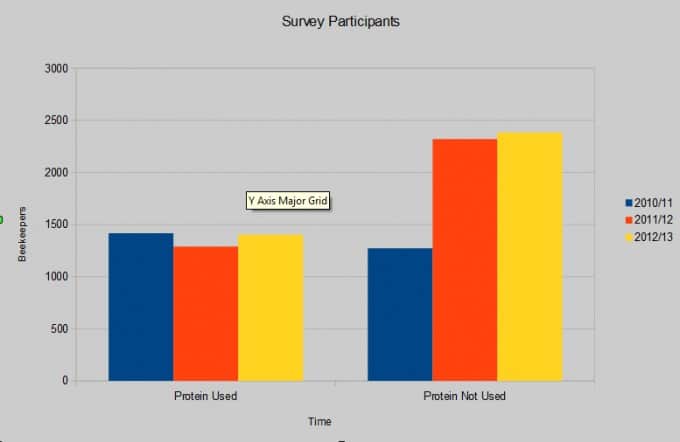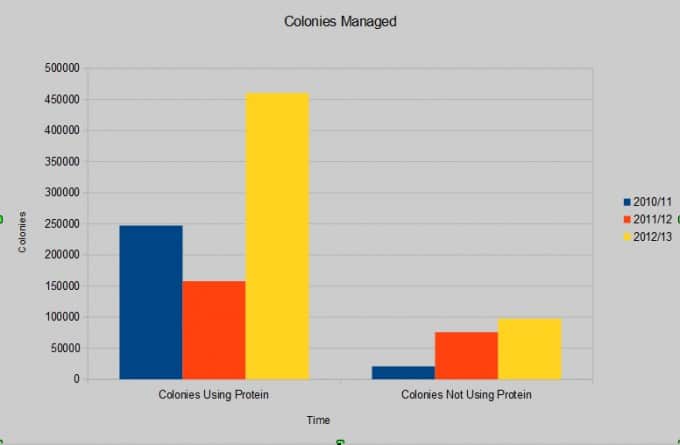Bottom Line at the Top
The BIP survey is a significant set of data having included participation of thousands of beekeepers and tens of thousands of colonies. Although the survey has not yet become refined enough to give us causative insight, it does spell out some bottom line results. My writing is my personal take on that data, not necessarily agreed to or approved by the BIP staff.
Three years worth of protein feeding data shows that there is no statistically significant benefit. Feed your bees protein (with all the added expense and work that goes with that) or don’t feed your bees protein, in either case you get exactly the same mortality rate. This is true without regard to which protein or protein substitute you choose.
This is not what beekeepers want to believe. We want there to be things that we as beekeepers can do to help our livestock. Unfortunately, when it comes to protein supplements, that simply may not be the case.
Feeding Protein
By Don Studinski, Colorado beekeeper and guest author for BIP
When I studied the BIP data regarding feeding carbohydrates1, I was surprised by what I learned and ended up changing management practices as a result. Now, I’ve got the same questions about the data related to feeding protein.
I generally think of myself falling in the “I don’t feed protein” camp of beekeepers; but the truth is that it seems every year there is an exception: some colonies that need to be fed protein and I find myself doing just that. Historically, when I feed protein, I do so using candy bricks. Think candy board, but without the wooden ware. These bricks with MegaBee® mixed in are placed over the brood nest in winter. I didn’t choose MegaBee for any particular reason, it’s just what I happened to buy.
I’m also curious about the effect of the different protein substitutes. Maybe I should be purchasing something different than MegaBee. What better place to figure this out than the BIP survey results? I don’t have to find out by my own trial and error. All my beekeeping friends throughout the USA are already running the trial and error for me and reporting their results into the survey.
Three Years of Data
I began my quest using the survey results from 2010-20112. Then I looked at the 2011-20123 data. And I finished up with the latest available which is 2012-20134. All three surveys are covering from 1 April to 31 March and the question asks about beekeepers who:
did not feed and did feed a majority of their colonies, at least once between April and March
I quickly became curious about how the participation might be changing over time. So, I put together a chart so I could better see what was happening. The chart shows that the number of beekeepers participating in the survey is increasing a lot, but the number of beekeepers using protein is not changing much.
 Likewise, I wanted to see the change in colonies managed. This showed a surprise. The number of colonies being fed protein has grown massively (chart below), but the number of beekeepers not using protein has also grown (chart above). This says that a few beekeepers that use supplemental protein feed are managing a lot more colonies over this period of time.
Likewise, I wanted to see the change in colonies managed. This showed a surprise. The number of colonies being fed protein has grown massively (chart below), but the number of beekeepers not using protein has also grown (chart above). This says that a few beekeepers that use supplemental protein feed are managing a lot more colonies over this period of time.
 Could it be that an extra 300,000 colonies being fed protein (from ’12 to ’13) had a dramatic effect on the overall colony survival? It’s seems unlikely as we shall see looking at the rest of the data.
Could it be that an extra 300,000 colonies being fed protein (from ’12 to ’13) had a dramatic effect on the overall colony survival? It’s seems unlikely as we shall see looking at the rest of the data.
Again, Feeding Doesn’t Matter
There is no statistically significant difference in mortality for those who feed protein supplements and those that do not. In 2010/11 losses were 34% either way. In 2011/12 losses were 23% either way. In 2012/13 losses were 43% either way. It’s not protein feeding that is making the big swing difference in survival rate.
Regionally, BIP has shown that beekeepers in the north tend to lose more colonies than beekeepers in the south. Duh! Is there anyone that didn’t expect that? But, feeding protein has no significant effect regionally. That is, for those in the south, feed protein or don’t feed protein, it doesn’t matter, the results are the same. Likewise, for those in the north, feed protein or don’t feed protein, the mortality rate is the same. Even multiregional results show no statistically significant difference between those that feed protein and those that do not.
There was a tiny eyebrow raising data point when it came to feeding specific supplements. Ener-G-Plus, used by 18 beekeepers on 98 colonies, showed an 18% mean loss in 2011 with a swing between 3% and 33%. Unfortunately, the potentially good trend didn’t repeat in 2012 where their mean loss was 23% overall (equivalent to the big picture results cited above). Again it was a small sample size of seven beekeepers and 115 colonies and a wildly swinging result between one and 45%. Even more unfortunate was that the product fell out of the survey results completely in 2013, so we may never know if there was anything potentially valuable about Ener-G-Plus. Remember, these data make no comment as to causes.
Another tiny blip came onto the radar in 2012. The supplement LaFore Pattie showed a 21% mean colony loss (not much different from the other supplements). It was used by 12 beekeepers on 25,297 colonies. Unfortunately, the samples varied wildly, between three and 39% colony loss. In 2013, LaFore Pattie showed promise with mean colony loss at 28% (compared to all the others at 40%+). The samples ranged from 13% to 42% loss submitted by 13 beekeepers for 25,791 colonies. We must wait to see if anything comes of LaFore Pattie. Encouraging results can prompt us to learn more, but we do not fully understand the causes based on this survey.
As for the remaining supplements: Bee-Pro, Commercial Patty and MegaBee, they clearly have no statistically significant effect on colony mortality for three years consecutively.
Follow Through Needs Improvement
In 2011, the BIP team noticed the seemingly insignificant effect of feeding protein and stated:
We did not collect data on how much or how frequently different feeds were applied. These factors may have an impact on effectiveness and we plan to collect this information next year.
And also stated, concerning the protein supplements:
No data were collected on the delivery method or the dose of product used. This variable may be important in determining this product’s effect, if any, on survivorship. We plan to collect these data in future years.
The team again noted the need for enhancing the data collected by repeating these two statements in 2012. I followed up with the BIP team and found that they did indeed add the questions to gather more detail starting in 2012, but they have not yet analyzed that data. When they get to it, there are now three years worth of the added detail available: 2012, 2013 and 2014. Their goal is to have this data available later in 2014 or early 2015.
My Conclusion
I think I’m wasting my time and money on protein supplement. I’ll be finishing up what I have and not purchasing any more. The BIP survey clearly shows for three years running that protein supplement is of no significant value. Feed them or don’t feed them, it makes no difference. Your losses may be low or they may be high, but it’s not protein supplement that is making the difference.
I watch my bees pretty closely and I see them packing in the natural pollen. And they are finding plenty of it. In fact, I see them with left over bee bread on the frames every year. I know that pollen is carrying a load of systemic poisons and I wish I could get them consistently clean pollen, but that’s not going to happen in the near future. In the mean time, it seems to be what they need because those that don’t feed supplemental protein are doing just as well as those that do.
We may someday have a protein supplement worthy of our money and effort. That day has not yet come with any decisive evidence.
About the Author:
Don Studinski, dba Honeybee Keep, is a permaculture enthusiast and member of the board of directors at Living Systems Institute (LSI) where he applies permaculture philosophy to beekeeping. Apiaries under Don’s management are located from Golden to Erie, spanning about 50 miles. Honeybee Keep manages Colorado’s first Certified Naturally Grown apiaries. Don’s beekeeping articles have been published in Bee Culture magazine and on-line at Honeybee Haven, Peak Prosperity and Selene River Press.
As a beekeeping mentor, Don provides advice and counsel for students throughout the United States. You can reach him using dstudin@yahoo.com. Colorado Bees for Colorado Beekeepers is Don’s “produce local bees” project which provides nucleus colonies for sale. Learn more about beekeeping, read free articles and see all the products and services provided by Honeybee Keep at HoneybeeKeep.com.
Don has a BS in Computer Science and an MS in Computer Information Systems. He spent his computer career working for IBM, StorageTek, and McKesson as a programmer, manager and director. He has also owned and operated his own t-shirt and embroidery business. Today, Don spends his time as a beekeeper, mentor and community building activist. He removes bees and wasps from structures, collects swarms, sells honey, performs public speaking, provides honey extraction and provides beekeeping consulting.